Understanding the Vital Role of Body Fridges in Funeral Services
Body fridges (also called mortuary refrigerators) are specialized cooling units designed to preserve human remains by maintaining temperatures between 2-4°C (36-39°F) to delay decomposition. These essential devices serve both dignity and public health purposes in funeral homes, hospitals, and forensic facilities.
| Body Fridge Quick Facts | |
|---|---|
| Primary Purpose | Preserve human remains and delay decomposition |
| Temperature Range | 2-4°C (36-39°F) for standard units |
| Storage Duration | Several days to weeks (positive temperature) |
| Common Types | Cabinet-style, walk-in, positive/negative temp |
| Key Features | Stainless steel, digital controls, alarm systems |
When a person passes away, natural decomposition begins almost immediately. Body fridges provide a critical solution by slowing this process through controlled refrigeration, creating a dignified environment for families while ensuring safe handling of the deceased.
Modern mortuary refrigerators come in various configurations, from single-body units to walk-in rooms capable of storing 100+ bodies. They feature precise temperature controls, durable materials like stainless steel, and specialized design elements that support the unique needs of funeral professionals.
Unlike standard refrigerators, body fridges maintain consistent temperatures with minimal fluctuation, include backup systems for power failures, and offer specialized body trays for respectful handling. These purpose-built units represent a significant improvement over improvised cooling methods used in the past.
I'm Mortuary Cooler, a national-level supplier of mortuary refrigeration systems with extensive experience designing and installing body fridges across the United States. My expertise helps funeral directors select the right equipment to maintain dignity and compliance while managing operational costs.
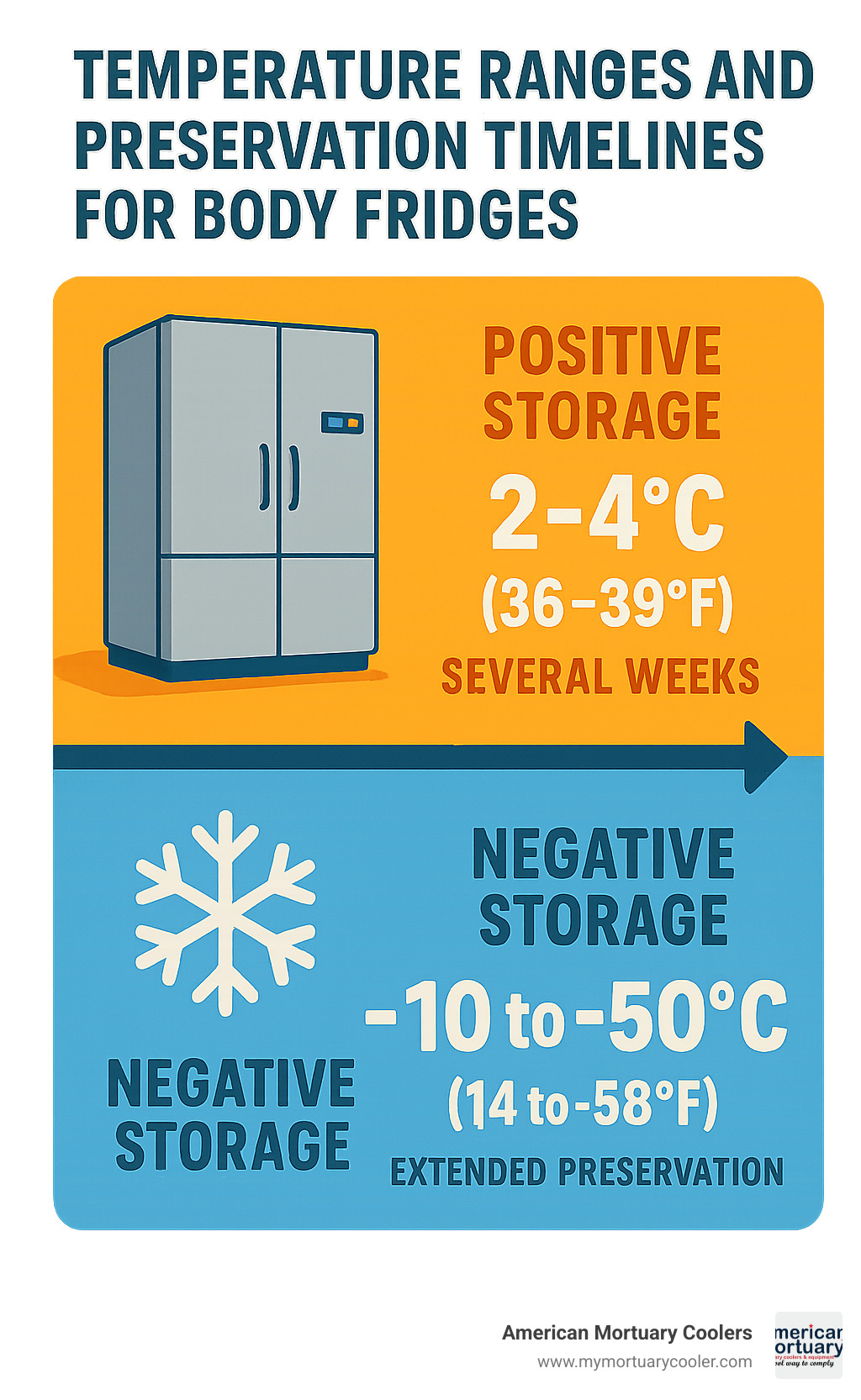
Find more about body fridges:
Understanding Body Fridges: Purpose, Mechanics & Temperature Science
When someone passes away, time becomes a delicate factor. That's where body fridges come in – these specialized cooling units serve as guardians of dignity and public health by preserving human remains until final arrangements can be made.
Think of a mortuary refrigerator as a pause button for nature's processes. Inside these units, a sophisticated cadaver cooling cycle maintains the perfect temperature to slow decomposition. The heart of the system is a compressor that circulates refrigerant, while thick polyurethane insulation (typically 60-80mm) creates a thermal barrier between the interior and the outside world.
What many people don't realize is the importance of the vapor barrier in these systems. This seemingly small feature prevents condensation from forming within the insulation – something that could significantly reduce effectiveness over time. It's these thoughtful engineering details that make body fridges so reliable when they matter most.
Temperature precision is everything in mortuary science. Standard units maintain bodies between 2-4°C (36-39°F), while specialized freezer units can reach as cold as -10 to -50°C (-14 to -58°F). Modern systems display temperatures with remarkable 0.1°C precision and include data-logging capabilities and alarms to ensure nothing goes unnoticed.
How Body Fridges Slow Decomposition
The science behind preservation is fascinating. At room temperature, our bodies begin a natural process after death – bacteria multiply rapidly while cellular enzymes begin autolysis (essentially, cells self-digesting). By maintaining temperatures just above freezing, body fridges dramatically slow both of these processes.
Humidity control is another crucial factor that quality units manage carefully. Too much moisture accelerates decomposition and can promote unwanted microbial growth. That's why advanced body fridges incorporate strategic airflow fans that ensure uniform cooling while maintaining optimal humidity levels throughout the chamber.
This perfect balance of temperature, humidity, and airflow creates an environment that preserves the deceased's natural appearance – something incredibly important for family viewings, religious observances, and medical examinations.
Recommended Temperature Ranges & Why They Matter
Not all body fridges serve the same purpose, which is why temperature ranges matter so much:
Positive storage units (2-4°C) are perfect for typical funeral home and hospital needs. They maintain the body's natural appearance without freezing tissues, making preparation for viewings much easier. This range is ideal for short to medium-term preservation spanning days to weeks.
Negative storage units (-10 to -50°C) serve specialized needs in forensic settings or disaster response scenarios. By freezing tissues, these units can preserve remains for extended periods – essential when identification or examination might be delayed by weeks or months.
The most versatile facilities often feature body fridges with independent chambers, allowing different remains to be stored at distinct temperatures based on specific requirements. For peace of mind during power outages, quality units include lithium-battery backup systems that maintain temperature displays and alarm functions for up to 72 hours.
The precision of these systems is remarkable – the best units offer temperature control in 0.1°C increments, ensuring optimal preservation conditions custom to exact needs. This level of control is why professional mortuary refrigeration systems are irreplaceable in the funeral industry.
For more scientific insights on refrigeration and decomposition, check out the research on body care cooling techniques from the Home Funeral Alliance.
Types of Body Fridges: Cabinets, Walk-Ins & Cooling Technologies
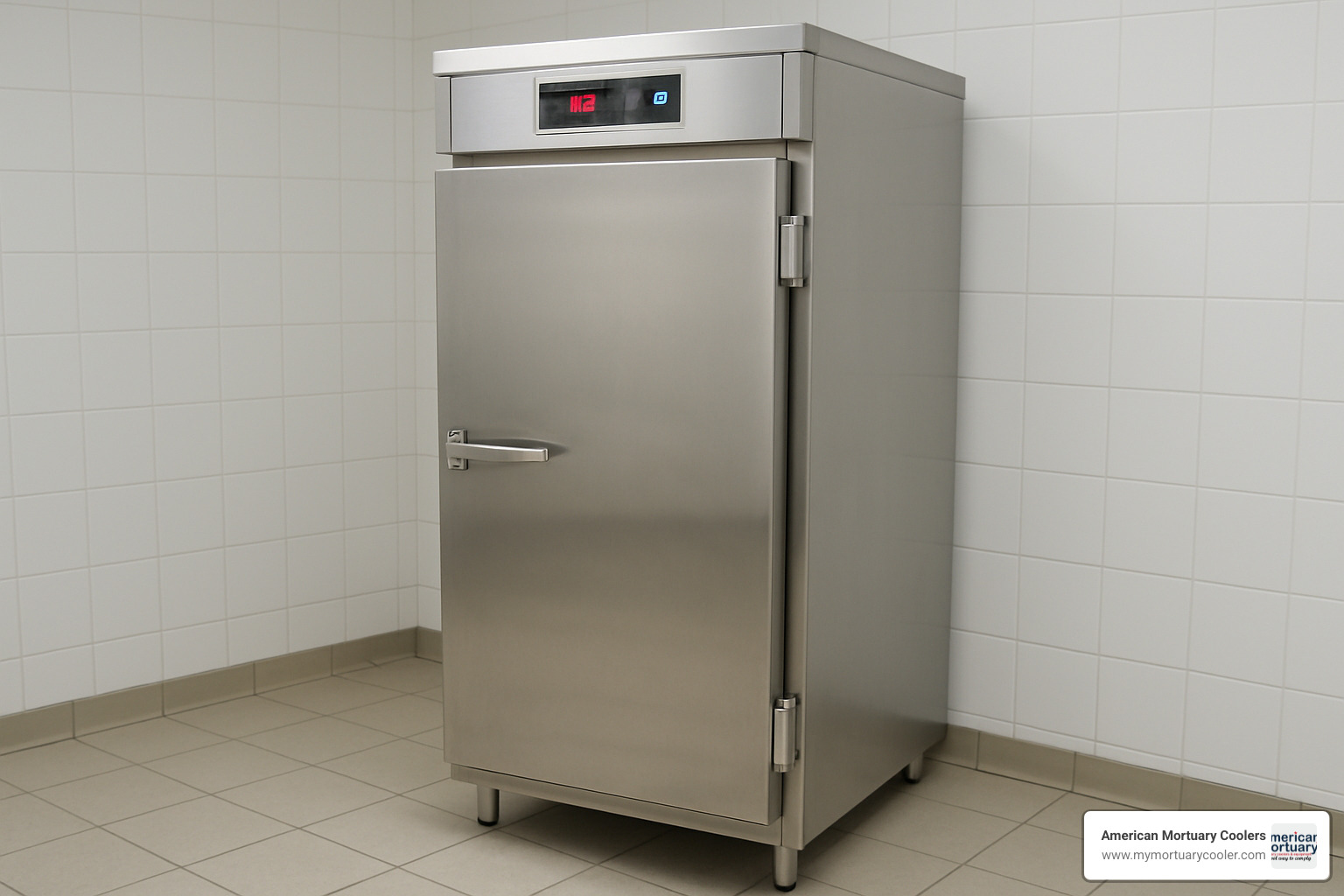
When you're in the business of caring for the deceased, choosing the right body fridge is one of the most important decisions you'll make. Here at American Mortuary Coolers, we've helped countless funeral directors find their perfect match – whether it's a compact single-body unit for a small family-owned funeral home or a spacious walk-in system for a busy medical examiner's office.
Positive-Temperature Body Fridges (2-4°C)
Most funeral homes rely on positive-temperature body fridges as their workhorses. These units maintain a gentle cooling range between 2-4°C – just cold enough to significantly slow decomposition without freezing the remains.
Think of these as the "Goldilocks" of mortuary refrigeration – not too cold, not too warm, but just right. They're perfect for short-term storage when families need time to gather or when preparing for viewings. The bodies remain in a natural state, making embalming and preparation work straightforward.
These units are also more budget-friendly to operate. Their moderate temperature requirements mean lower energy bills – something every funeral director appreciates when managing monthly expenses. Plus, the consistent cooling helps control odors naturally, creating a more pleasant environment for both staff and visiting families.
Negative-Temperature Body Fridges (-10°C to -50°C)
When preservation needs extend beyond a few weeks, negative-temperature body fridges become essential. Operating at temperatures ranging from a chilly -10°C down to a frigid -50°C, these specialized freezers nearly halt the decomposition process entirely.
Forensic labs rely on these units when investigations may take months to complete. Medical examiners use them when identification is challenging or when legal proceedings require long-term preservation of evidence. And during mass casualty events, these powerful cooling systems provide the extended preservation time needed during overwhelming circumstances.
While these units offer superior long-term preservation, they do come with considerations. Bodies will need thawing before examination or preparation, and the freezing process itself can affect tissue appearance. They also consume more energy than their positive-temperature cousins, making them less common in standard funeral homes but invaluable in specialized settings.
Single vs Multi-Body Cabinets
The size of your operation will largely determine which cabinet configuration makes sense for your facility. Body fridges come in surprisingly diverse capacities:
A single-body unit might be perfect for a satellite location or small rural funeral home handling fewer cases. Our two-body refrigerators represent our most popular option – offering the right balance of capacity and footprint for most small to medium operations.
For busier facilities, our larger cabinets can accommodate 3, 4, 6, 8, or even 12 bodies in a single unit. Many feature independent cooling systems for each chamber, giving you the flexibility to maintain different temperatures based on individual needs.
All our cabinets include high-quality stainless steel trays that glide smoothly for dignified and effortless transfers. Our 2-body models typically range from $1,600 to $2,500, making professional-grade refrigeration accessible to funeral homes of all sizes.
Walk-In Body Refrigerator Rooms
When your capacity needs grow beyond what cabinets can provide, our walk-in body fridges offer the ultimate solution. These modular rooms transform available space into efficient, high-capacity cooling environments.
The beauty of these systems lies in their flexibility. Starting with as few as 4 bodies and expanding to hold 100 or more, these rooms grow with your needs. Their clever cantilever rack systems maximize every square foot, while maintaining proper ventilation with 5-6 complete air changes hourly.
Construction consists of precision-formed insulated panels that fit together perfectly during installation. This modular approach means you can disassemble, relocate, or expand your walk-in cooler as your business evolves – something our clients particularly value when planning for future growth.
| Type | Temperature Range | Typical Capacity | Best For | Approximate Cost Range |
|---|---|---|---|---|
| Positive Cabinet | 2-4°C | 1-12 bodies | Funeral homes, hospitals | $1,600-$33,000 |
| Negative Cabinet | -10 to -50°C | 1-8 bodies | Forensic labs, ME offices | $3,000-$40,000 |
| Walk-In Positive | 2-4°C | 4-100+ bodies | Large facilities, mass casualty | $15,000-$100,000+ |
| Walk-In Negative | -10 to -50°C | 4-50+ bodies | Research, long-term storage | $25,000-$150,000+ |
Want to learn more about walk-in options? We've put together a comprehensive guide on what is a walk-in body refrigerator that explores their importance for funeral homes in detail.
Key Features & Components Every Buyer Should Evaluate
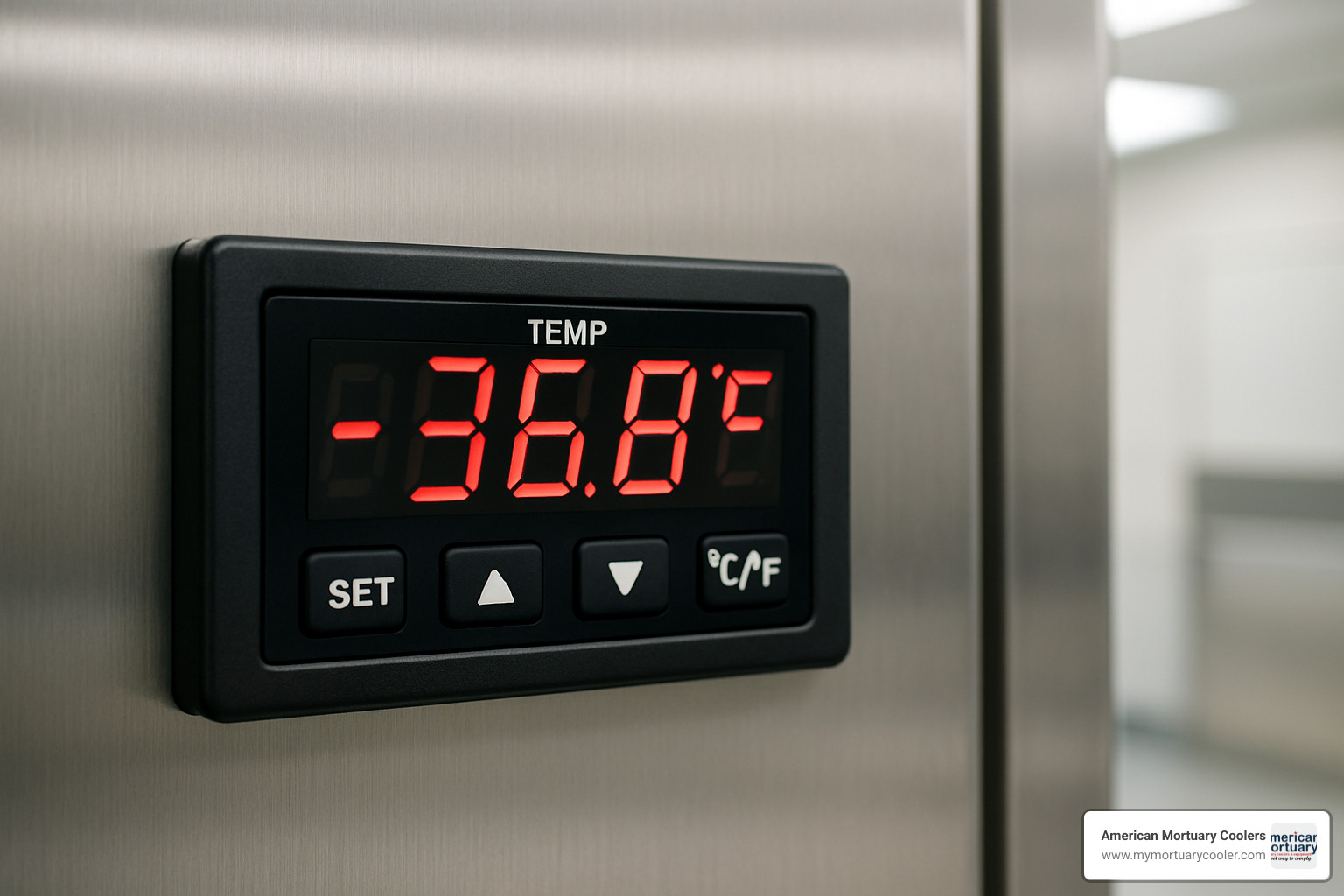
When you're in the market for a body fridge, knowing what makes a quality unit can feel overwhelming. At American Mortuary Coolers, we believe in helping you understand what really matters in these essential pieces of equipment.
The backbone of any good mortuary refrigerator starts with its construction materials. We craft our units using 304 stainless steel inside and out – not just because it looks professional, but because this medical-grade material stands up to years of rigorous cleaning without corroding. Think of it as the difference between a budget kitchen appliance and a professional chef's tools – the quality shows in longevity.
Beneath that sleek exterior lies the unsung hero of temperature stability: insulation. Our 60-80mm thick polyurethane foam panels might not be visible, but they're working around the clock to maintain those critical internal temperatures while keeping your energy bills manageable. This high-density insulation limits heat transfer to approximately 8 W/m² – a technical way of saying your unit stays cold without overworking.
The brains of modern body fridges have come a long way from the simple thermostats of yesteryear. Today's digital controllers display temperatures with remarkable 0.1°C precision – essential when preservation depends on consistent conditions. Many of our clients appreciate features like RS-232 data ports for downloading temperature history (perfect for documentation and compliance), and password protection that prevents unauthorized temperature adjustments.
The importance of a good seal can't be overstated. Those heavy-duty, replaceable gaskets create a vapor-tight environment that maintains temperature integrity while preventing odors. It's like the difference between a quality cooler that keeps ice frozen all weekend versus one that leaves you with a puddle by lunchtime.
We've also acceptd environmentally-friendly refrigerants that comply with global standards without compromising cooling performance. These green refrigerants help reduce your facility's environmental footprint – something increasingly important to families and communities alike.
Safety, Health & Regulatory Compliance
In the funeral profession, compliance isn't just paperwork – it's peace of mind. Our body fridges feature OSHA-compliant emergency release handles inside all chambers, ensuring no one could ever become accidentally trapped. The CE marking on applicable components signals adherence to European safety standards, often stricter than domestic requirements.
The lighting fixtures in our units are specially designed to be vapor-tight and rated for refrigerated environments – a small detail that makes a big difference in long-term reliability. We've also incorporated biohazard protocols into our designs and materials, ensuring your facility meets or exceeds local health department regulations.
These aren't just selling points – they're essential protections for your staff, your facility, and the families you serve. As one funeral director told us, "The last thing I need is equipment that creates problems instead of solving them."
Accessories & Complementary Equipment
A body fridge works best as part of a thoughtfully designed system. Mortuary trolleys that align perfectly with your refrigerator height eliminate awkward transfers. Roll-in cooler ramps make moving heavier remains dignified and safe for your staff. Proper body bags and containment systems provide an additional layer of infection control and preservation.
Many of our clients also invest in telescoping slide rails for easier access to remains, external temperature loggers for independent verification (particularly important for facilities seeking accreditation), and backup power systems that prevent catastrophic failures during outages.
These accessories aren't extras – they're integral parts of a complete system that helps your team work efficiently while maintaining the highest standards of care and dignity.
Mortuary Refrigerators vs Freezers
Understanding the fundamental differences between refrigeration and freezing helps ensure you select the right equipment for your specific needs.
Standard mortuary refrigerators maintain temperatures between 2-4°C, preserving remains without freezing tissues. This temperature range maintains natural appearance and flexibility – crucial if you're preparing bodies for viewing. They consume less energy than freezers and allow immediate access for preparation without thawing. They're perfect for typical funeral home operations where remains are held for days to a few weeks.
Mortuary freezers operate at much colder temperatures (-10°C to -50°C) and serve a different purpose. By freezing tissues, they halt decomposition almost entirely, making them essential for long-term storage or special circumstances. However, they come with higher operating costs, require thawing before preparation, and may slightly alter tissue appearance.
As one medical examiner explained to us, "Refrigerators are for routine operations; freezers are for exceptional circumstances." Your choice depends on your facility's specific needs, storage duration expectations, budget considerations, and the services you provide.
For more detailed information about these essential features, visit our comprehensive guide to body refrigerators on our website.
Selecting, Installing & Maintaining a Body Fridge
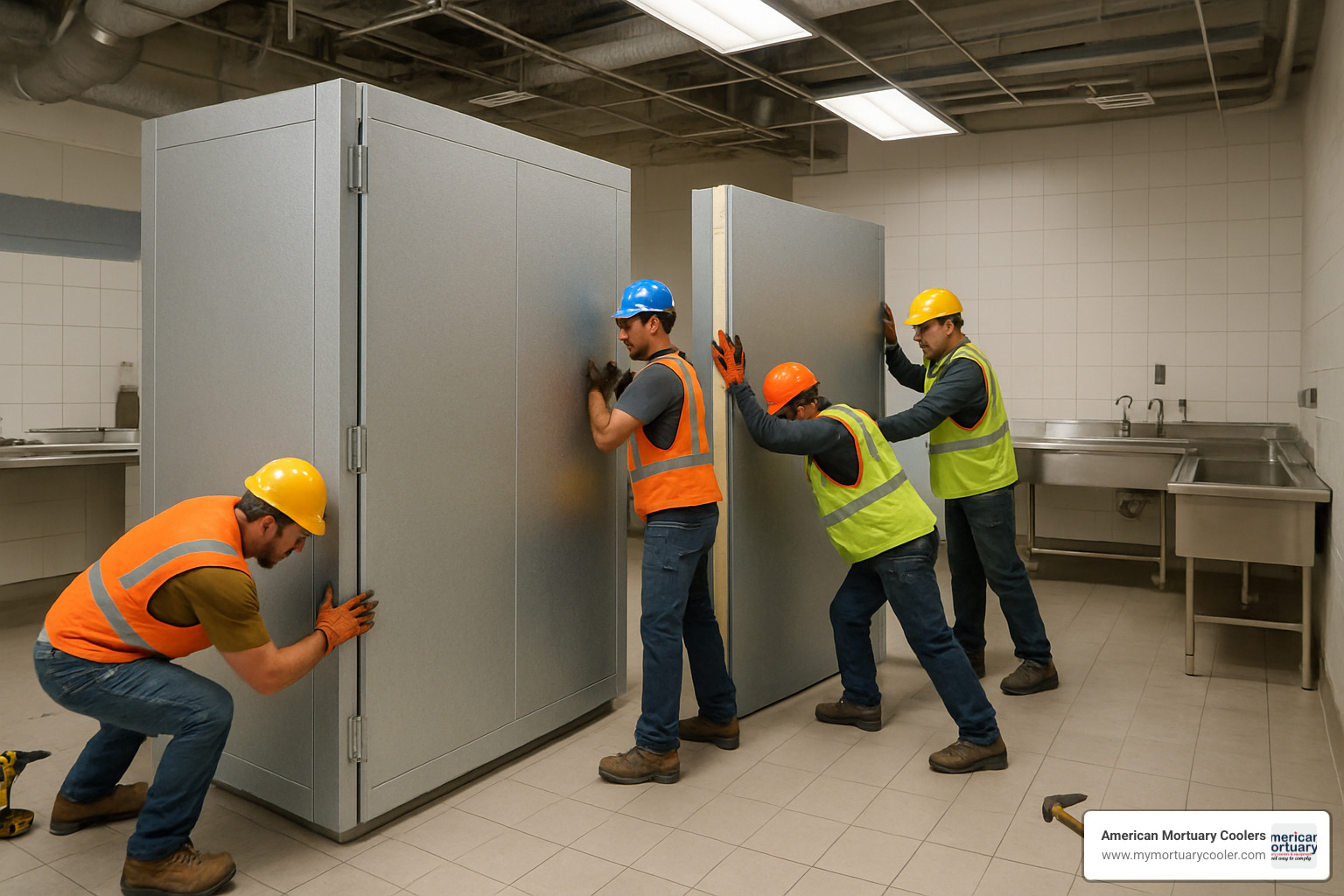
Finding the perfect body fridge for your facility doesn't have to be overwhelming. At American Mortuary Coolers, we walk alongside you through this important decision, ensuring you get equipment that truly fits your needs without breaking the bank.
Smart capacity planning means thinking beyond today's needs. We typically recommend choosing a unit with at least 20% more capacity than your current average—because that unexpected surge in cases always seems to happen at the worst possible time. Your future self will thank you for the extra space!
When considering where to place your new body fridge, think about the practical everyday details. You'll need adequate door swing clearance (at least 36 inches), sufficient access space for maintenance (18-24 inches works well), and proximity to your preparation areas to minimize transfer time. The right placement creates smooth workflow patterns that your staff will appreciate during busy periods.
Most smaller cabinet-style body fridges happily run on standard 110V circuits, while their bigger siblings—especially walk-ins—typically need 220V service. Whatever size you choose, we strongly recommend dedicated circuits and, if possible, backup power. After all, refrigeration is one area where "always on" isn't just convenient—it's essential.
Your cooling system needs room to breathe! Allow at least 12 inches of clearance around external condensers. This simple step prevents overheating and extends the life of your system considerably.
Buying Considerations & Cost Ranges
Quality mortuary refrigeration is an investment in your facility's reputation and capabilities. Single-body units typically range from $1,600-$5,800, while our popular two-body units run between $1,600-$6,200. Larger cabinet options for three to four bodies fall in the $6,000-$15,000 range, with six to eight-body units commanding $25,000-$33,000. Our walk-in coolers start around $15,000 for smaller configurations and can exceed $30,000 for larger installations.
When calculating the true cost of ownership, look beyond the price tag. Consider the unit's energy efficiency ratings and how they'll impact your monthly bills. Our generous warranty coverage (10 years on panels, 1 year on compressors) provides peace of mind, while availability of local service technicians can save headaches down the road. Many of our customers are pleasantly surprised to find that utility companies often offer energy rebates that can offset part of the purchase price.
Financing options can make high-quality body fridges more accessible, with energy savings helping to offset monthly payments. It's like the unit partially pays for itself through efficiency!
Step-by-Step Installation Checklist
Proper installation is the foundation of reliable performance for your body fridge. The process begins with thorough site preparation—ensuring your floor is level and strong enough to support the fully loaded unit, confirming ceiling clearance (typically 8 feet minimum), and measuring doorways to guarantee smooth delivery.
For walk-in units, panel assembly follows a logical sequence. We start with floor panels when applicable, then erect wall panels using our secure cam-lock system, followed by ceiling panels. All interior seams receive food-grade sealant to create a proper vapor barrier.
Electrical connections require attention to detail. Your body fridge needs connection to an appropriate dedicated circuit with verified voltage and amperage that meet specifications. We recommend surge protection if it's not already integrated into the unit.
The refrigeration system installation involves mounting the condensing unit with proper clearance, connecting refrigerant lines (if not pre-charged), and in some cases, evacuating the system and charging with refrigerant.
Before we consider any installation complete, we run the system for a full 24 hours, verifying temperature stability within ±1°C, testing all alarms and safety features, and calibrating temperature displays if necessary.
At American Mortuary Coolers, we offer flexible delivery options. Choose either delivery via common carrier with detailed installation instructions, or opt for our factory-direct delivery with optional professional installation services throughout our service regions.
Best Practices for Daily Operation
Treating your body fridge right ensures it will be there for you when you need it most. Maintain detailed temperature logs with readings at least twice daily—this simple habit can catch potential issues before they become problems.
Weekly sanitizing of interior surfaces with appropriate non-corrosive disinfectants keeps your unit clean and ready for service. Monthly alarm tests ensure your safety systems remain vigilant, while limiting door-open time helps maintain stable temperatures (and keeps your energy bills in check).
We recommend conducting quarterly power-failure drills to verify your backup systems perform as expected. Regular staff training on proper PPE and handling procedures protects both your team and the dignity of those in your care.
Professional service checks every 6-12 months complete your maintenance routine. Think of these as wellness visits for your equipment—preventative care that helps avoid emergency situations.
Following these straightforward practices not only extends your equipment's life but ensures consistent performance when families are counting on your services the most.
Innovations, Trends & Market Outlook
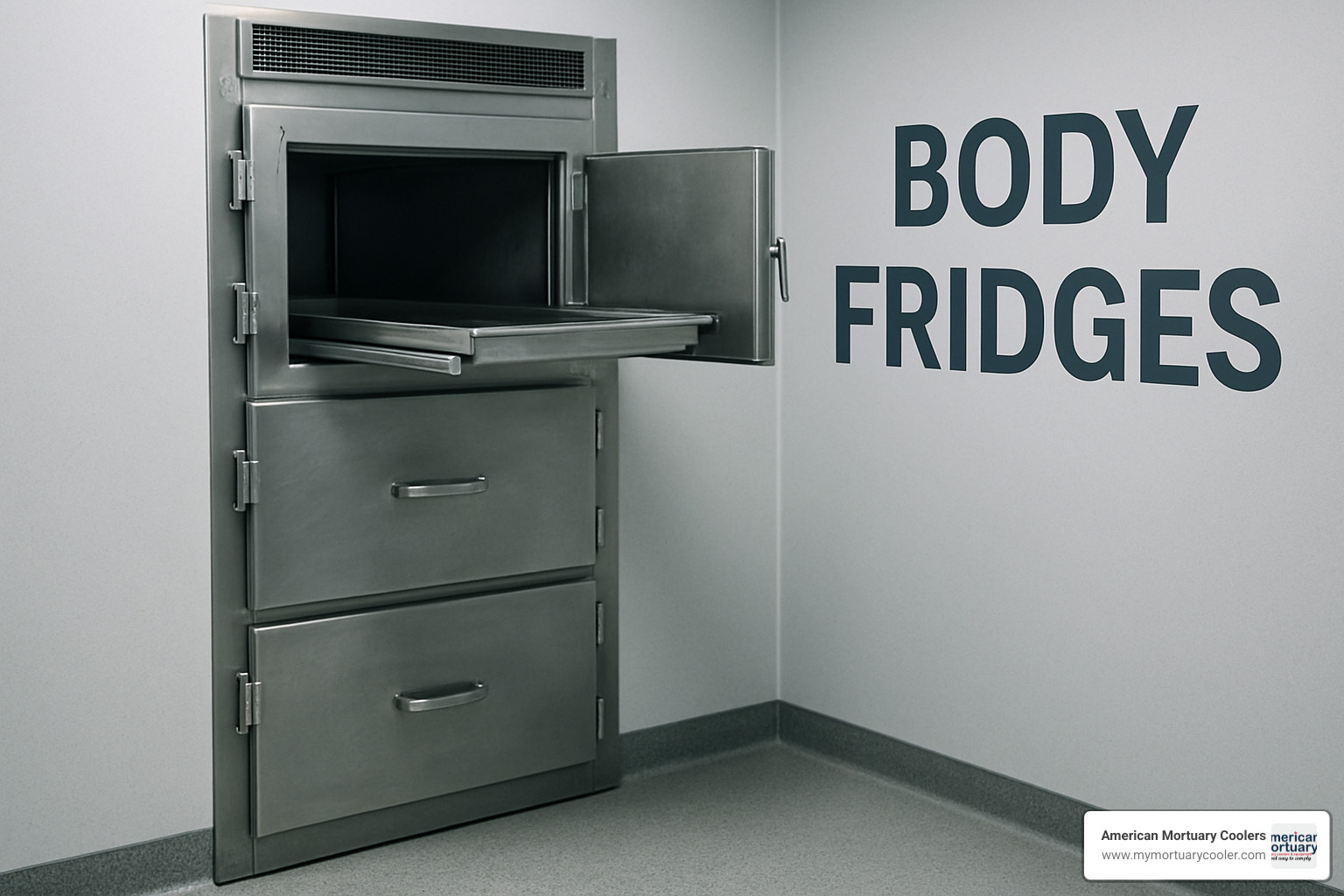
The world of mortuary refrigeration is far from static. Here at American Mortuary Coolers, we're constantly amazed by how technology transforms even this specialized industry. The innovations we're seeing today make yesterday's body fridges look practically ancient!
Remember when checking temperatures meant physically walking to each unit with a clipboard? Those days are fading fast. Today's smart IoT monitoring systems connect your body fridges to secure cloud platforms, giving you peace of mind around the clock. When I visit funeral homes with these systems installed, directors often tell me how they sleep better knowing they'll get an instant text alert if anything goes wrong. Plus, all that historical temperature data gets automatically logged—making those regulatory inspections much less stressful.
Environmental consciousness has firmly taken root in our industry too. We're proud that our newest body fridges feature refrigerants that won't harm the ozone layer. The improved insulation materials we're using don't just protect the planet—they protect your utility bills too! One funeral director in Missouri called me last month to share how his electric bill dropped nearly 30% after upgrading to our energy-efficient models with variable-speed compressors.
The antimicrobial revolution has reached mortuary refrigeration as well. Our SmartProtec® coatings actively fight bacterial growth on both interior and exterior surfaces. As one medical examiner told me, "In our line of work, you can never be too careful about cross-contamination." These specialized surfaces provide that extra layer of protection that brings real peace of mind to staff members.
Flexibility has become increasingly important in today's unpredictable world. Our AirCool portable pop-up units have proven invaluable during disaster response situations. After a recent hurricane in Florida, these units helped a community maintain dignity for the deceased while permanent infrastructure was being restored. Meanwhile, our modular retrofit kits allow facilities to upgrade existing refrigeration without the expense of complete replacement.
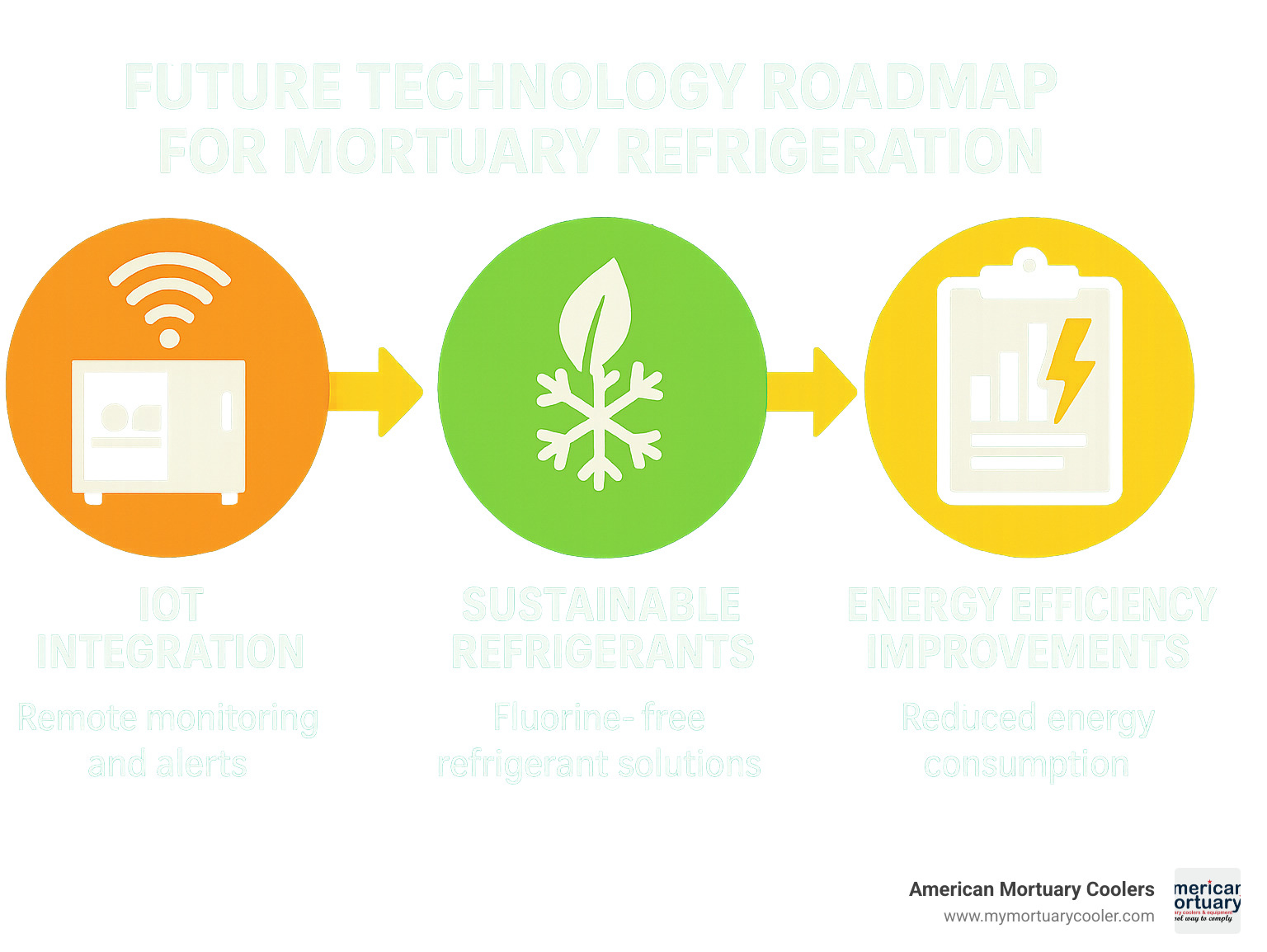
Bariatric-specific models have become essential as demographics change. These specialized body fridges accommodate larger individuals with dignity and respect. As one funeral director in Texas shared with me, "Having the right equipment means we never have to tell a family we can't properly care for their loved one."
Remote diagnostics capability might not sound exciting, but it's a game-changer for busy funeral homes. When a body fridge in Seattle started showing slight temperature fluctuations, our technicians diagnosed a failing relay switch before it caused a complete breakdown. The part was shipped overnight, and the unit never went offline. This predictive approach means your essential equipment stays running when you need it most.
As a 100% American-made manufacturer based in Tennessee, we take pride in blending these innovations with good old-fashioned durability. Our nationwide delivery network ensures funeral homes and medical facilities across all 48 contiguous states have access to the latest technology without sacrificing reliability.
The future of body fridges looks bright (though perhaps "cool" would be more appropriate!). We're working on hybrid units that can switch between refrigeration and freezing modes, giving facilities unprecedented flexibility. And our engineering team is exploring energy recovery systems that capture waste heat for use elsewhere in the facility—turning what was once wasted energy into a resource.
Want to learn more about how these innovations can benefit your facility? Check out our detailed guide to body refrigerator features for a deeper dive into what makes modern mortuary refrigeration so remarkable.
Frequently Asked Questions about Body Fridges
How long can a body stay in a fridge at 4°C?
One of the most common questions we hear at American Mortuary Coolers concerns preservation timeframes. When properly maintained at the ideal temperature range of 2-4°C (36-39°F), a body can typically be preserved for 4-6 weeks before significant decomposition becomes apparent.
That said, most of our funeral home clients aim to complete services within 1-2 weeks of refrigeration – not because the body fridge can't maintain preservation longer, but because this timeline typically aligns with family needs and service scheduling.
Several factors influence how long effective preservation lasts, including the condition of the remains prior to refrigeration, whether embalming was performed, how consistently the temperature stays regulated, the humidity levels inside the unit, and even individual biological variations between bodies.
Our body fridges are engineered to maintain optimal preservation conditions for extended periods when necessary – something particularly valuable during holiday periods or when family members need to travel from afar. However, we always recommend proceeding with arrangements in a timely manner when possible.
What's the difference between a morgue fridge and a household freezer?
I sometimes hear from people wondering if a commercial freezer might work as a cost-saving alternative. While it might seem like a reasonable substitution, the differences are substantial and significant.
Body fridges differ from commercial or household units in several crucial ways that directly impact their effectiveness and appropriateness. First, temperature precision is dramatically different – our mortuary units maintain temperatures within ±1°C, while commercial freezers commonly fluctuate by ±3-5°C, potentially compromising preservation.
The construction materials also differ substantially. We use medical-grade stainless steel throughout our units specifically because it withstands the rigorous disinfection protocols necessary in mortuary settings. Standard commercial units simply aren't built for this level of sanitization.
Perhaps most importantly, body fridges incorporate critical backup systems including battery power and multi-point alarm systems that alert staff to any temperature deviations – essential safeguards that commercial units lack entirely.
The physical design differences are obvious once you see them – our specialized trays and interior dimensions are specifically engineered to accommodate full-length human remains with dignity and respect, something a commercial freezer simply cannot provide.
Using a household or commercial freezer for human remains isn't just inappropriate – in many jurisdictions, it may violate health regulations. More importantly, it fails to provide the dignity, preservation quality, and peace of mind that families deserve during a difficult time.
Do body fridges require special electrical wiring?
The electrical requirements for body fridges vary depending on the size and capacity of the unit you select. Our smaller cabinet-style units designed for 1-2 bodies typically operate efficiently on standard 110V/15A circuits – the same as you'd find in most homes and businesses.
As you move up in capacity, the power requirements increase accordingly. Our medium-sized units holding 3-4 bodies may require 110V/20A or 220V/15A dedicated circuits, while our larger cabinet units (6+ bodies) and walk-in coolers generally need 220V/20A service or higher.
Regardless of which model you choose, we strongly recommend several electrical best practices for all installations. Your body fridge should always be on a dedicated circuit not shared with other equipment – this prevents overloads and ensures continuous operation. Proper grounding and surge protection are essential to protect the sophisticated control systems that maintain precise temperatures.
Whenever possible, we recommend connecting mortuary refrigeration to emergency power systems or generators. This provides crucial protection during power outages, which, unfortunately, often coincide with severe weather events that can increase demand for mortuary services.
At American Mortuary Coolers, we provide detailed electrical specifications with every unit we sell, and our customer service team is always available to recommend appropriate electrical configurations based on your facility's existing infrastructure. We've designed our self-contained units to be as installation-friendly as possible while never compromising on the performance standards that matter most.
Conclusion & Next Steps
When it comes to caring for those who have passed, body fridges truly represent the intersection of dignity, science, and public health. Throughout this guide, we've walked through everything from basic cabinet units to advanced walk-in systems – all designed to provide respectful preservation while meeting essential health standards.
I've seen how the right mortuary refrigeration makes all the difference for funeral homes and medical facilities. It's not just equipment; it's peace of mind during what can be emotionally challenging work.
At American Mortuary Coolers, we take tremendous pride in our Tennessee craftsmanship. Every body fridge we create is 100% American-made, built with the understanding that you're entrusting us with an essential aspect of your professional responsibility.
Our support doesn't end when your unit arrives. We believe in building relationships with our customers through:
- Thoughtful consultation to match you with the perfect configuration
- Clear, no-surprise pricing that respects your budget
- Nationwide delivery with installation support when you need it
- Ongoing technical guidance from people who genuinely care
I remember visiting a small-town funeral home that had been struggling with an unreliable cooler for years. The relief on the director's face when we installed their new system spoke volumes – finally, they could focus on families instead of worrying about equipment failures.
Whether you're just starting out, replacing equipment that's seen better days, or expanding your services, we're here to help you steer the options. The right body fridge does more than preserve remains – it supports your ability to serve families with confidence and care.
For more details about our walk-in refrigerators and other mortuary solutions, visit our website. Our team genuinely enjoys helping funeral professionals find the perfect fit for their unique circumstances.
By choosing American Mortuary Coolers, you're partnering with people who understand the importance of your work. We're not just selling equipment – we're supporting the meaningful service you provide to families during their most difficult moments.
















